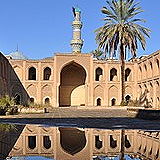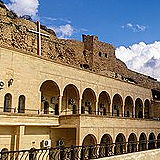
|
Baghdad, Iraq Iraq Last Updated: 08/22/2023 |
| Baghdad is the capital city of Iraq and one of the oldest continuously inhabited cities in the world. With a long and storied history, Baghdad has played a significant role in the development of culture, trade, and politics in the Middle East. Its population was 8,126,755 in 2018. | |
| - Historical Significance: Baghdad was founded in the 8th century AD by the Abbasid Caliph Al-Mansur. It became a prominent center of learning, culture, and commerce during the Islamic Golden Age. The city's House of Wisdom was a renowned institution that facilitated the translation and preservation of ancient Greek, Roman, and Persian texts. - Landmarks: Baghdad has been known for its architectural marvels, including the famous Abbasid palaces and mosques. The Al-Mustansiriya University, established in 1227, is one of the oldest universities in the world and remains a significant educational institution. - Tigris River: The city is situated along the banks of the Tigris River, which has historically played a vital role in Baghdad's trade and transportation. - Saddam Hussein Era: Under the rule of Saddam Hussein, Baghdad was modernized, but the city also witnessed significant repression and human rights abuses. The city's landscape underwent transformation with monumental architecture and infrastructure projects. - 2003 Invasion and Aftermath: The 2003 invasion of Iraq led to major changes in Baghdad. The toppling of Saddam Hussein's regime was followed by a period of instability, sectarian violence, and insurgency. The city saw significant destruction and rebuilding efforts in the years that followed. - Cultural Diversity: Baghdad has been home to diverse religious and ethnic communities, including Sunni and Shia Muslims, Christians, and others. However, the city's demographics have been altered by conflicts and displacements. - Security Concerns: Over the years, Baghdad has experienced various security challenges, including bombings, sectarian violence, and terrorism. The situation has improved in recent years, but security remains a concern. - Reconstruction and Development: In the post-conflict era, Baghdad has undergone extensive reconstruction efforts to rebuild infrastructure, public services, and facilities. - Economy: The city's economy is diverse, with sectors including trade, services, government, and more recently, oil-related activities. - Cultural Heritage: Baghdad's cultural heritage has suffered due to conflicts and instability. Many historical sites, monuments, and artifacts have been damaged or destroyed. | |
Wikipedia
Iraq » Baghdad
Place » City

|
Iraq Place » City Iraq is a country located in the Middle East, bordered by Iran to the east, Turkey to the north, Syria to the northwest, Jordan to the west, Saudi Arabia to the south, and Kuwait to the southeast. It has a rich history, diverse culture, and significant geopolitical importance in the region. Its population was 43.5 million in 2022. 183 views 💖 1 👍 0Iraq |